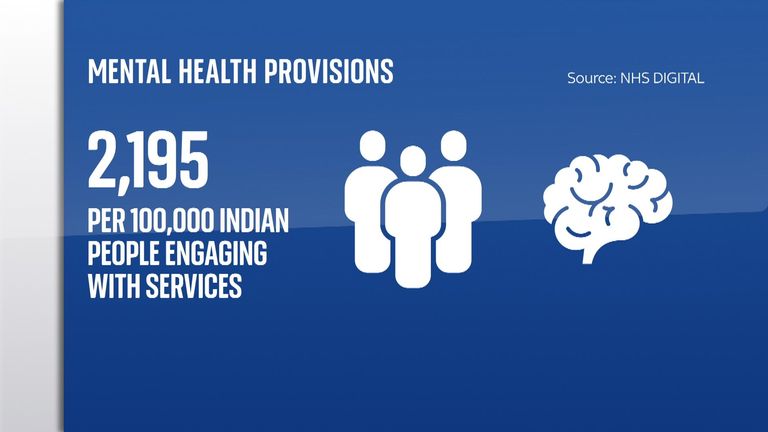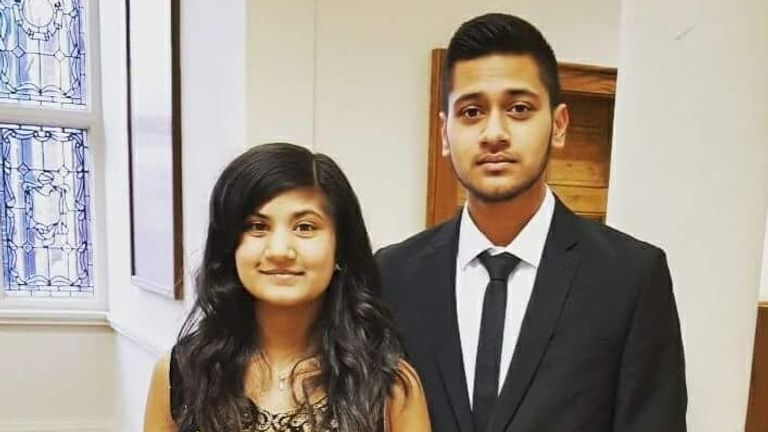Stigma and ‘one-size-fits all approach’ create barriers for South Asians seeking mental health help – experts
South Asian people are less likely to access mental health support due to stigma and a lack of awareness – and when they do, there are often barriers in treatment due to services offering a “one-size-fits-all approach”, according to some experts.
Dr Tina Mistry told Sky News “talking about the fact that somebody might be struggling” comes with “huge stigma” in the South Asian community, and often there’s “a lack of awareness of what services are out there”.
These factors contribute to low engagement with mental health services, but when people do access help, they’re often faced with cultural and language barriers.
Dr Mistry said: “There’s a huge issue around conceptual understanding around what mental health actually is within the South Asian community.
She said “because the NHS is a one-size-fits-all approach” it means that for many accessing services, “it doesn’t quite match or fit their conceptual needs and cultural needs”.
“This is a huge issue because it isn’t going to be cured overnight,” she added. “It’s a two-way conversation that needs to happen… between the service providers and the community.”
Hakeem, which isn’t his real name, suffers from depression and anxiety.
His problems stem from childhood trauma and were made worse when he experienced domestic abuse.
“I was living two lives, one in front of everyone at work and family, and the other behind closed doors where I live and it just couldn’t go on any longer,” he said.
“The types of issues I was facing were just getting bigger and bigger, and the underlying issues were never being tackled so I was encountering new obstacles without ever fixing or working or talking about things that were bothering me from years ago.
He said at his lowest point, he felt suicidal.
Facing stigma from his family and friends, and having already felt let down by the system, he struggled in silence for nearly a decade.
He said the first counsellor he saw “caused a nine-year delay” in getting the help he knew he needed.
His reluctance to return to counselling came from fears that his background and culture would be misunderstood.
“I didn’t want to be stereotyped, I didn’t want to be labelled more than I was already labelling myself,” he said.
“What I was looking for was someone who was actually going to understand the root of what I was talking about… and then give me something to think about off the back of that.
“I didn’t trust the process, I didn’t trust the system and I didn’t think that they were going to be able to help me.”
Hakeem is now receiving the support that he needs, having found a way to make the system work for him.
“I thought to myself if I explain things to the counsellor by giving them the context that I know that they’re lacking, then I can help them to understand how best to help me, and that’s exactly what I did week on week,” he said.
According to data provided to Sky News, 2,195 per 100,000 Asian people access NHS secondary mental health services, this is 4,030 per 100,000 for their white counterparts.
Uptake stands at 3,307 per 100,000 for Pakistani people and 3,407 per 100,000 for Bangladeshi people.
It’s lowest for the Indian community, where only 2,195 per 100,000 are seeking help.
Saroj Patel sought help after her teenage son took his own life.
She told Sky News: “I was shattered, I didn’t even know what exactly was going on within myself and I just felt like what do I do?”
After being referred to mental health services by her GP, she quickly became disengaged and dropped out, saying “it was more of like a book” that the therapist was following.
She said it would have been helpful to speak to someone who understood her background and came from the Asian community.
She eventually found the support she needed at Re:Route, one of few organisations designed to help the South Asian community, which she said “covered every topic” and “ticked every box”.
Sonam Patel founded Re:Route after she failed to find any services that catered for her background.
She told Sky News: “Things that are specific to our culture, you just need to talk about them and do it consistently, and that’s the one thing that we’ve always kept from the very beginning.
“Because of the depth and breadth of South Asians as a community, you’re just not going to get mainstream services that can cater to all the different intricacies.
“Each community has different subsets, has different cultural notions… so it’s a bit difficult for people to find things that they can engage with.”
Dr Rajesh Mohan, presidential lead for race equality at the Royal College of Psychiatrists, told Sky News: “Issues around stigma and taboo are complex and deep-rooted, so there are no quick fixes, but we can begin to tackle stigma by engaging with communities and proactively encouraging open conversations about mental health.
“However, stigma is not the only barrier. Mental health services need to look at whether they are truly inclusive and accessible to all.
“To improve access and quality, services should be reaching out, involving their communities and building trust.
“We need to ensure that all services are delivering culturally appropriate care, taking race, religion and language into account, so that everyone in need is able to get the right help.”
:: Anyone feeling emotionally distressed or suicidal can call Samaritans for help on 116 123 or email [email protected] in the UK. In the US, call the Samaritans branch in your area or 1 (800) 273-TALK.
Source: Read Full Article








